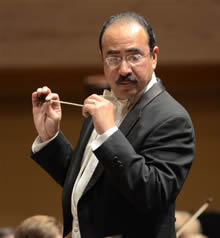The 2nd annual Paderewski Festival got underway in earnest with welcoming remarks by Dr. Alvin M. Fountain and artistic director Adam Wibrowski, followed by the music of Chopin, Paderewski, and Ravel as played by Hélène Tysman in St. Mary’s historic Smedes Parlor, a room dating from Chopin’s time. The guest artist was a 2010 finalist at the Chopin Competition in Warsaw. The recital was the first of a series of four being offered in four consecutive days. It’s a very big deal for piano enthusiasts, and the reaction of those in attendance on a cool Thursday evening was, well, enthusiastic.
The first half of the program was devoted to Chopin’s Preludes, Op. 28 – all 24 of them. These gems of the literature were probably not intended for performance in one fell swoop, but hearing them that way, particularly when played by such a superb artist, proved immensely rewarding.
The second half was considerably more varied. Tysman began with three short pieces by Paderewski (1860-1941), all dating from his third decade. The famous Minuet launched this group; played with the utmost respect, it was totally captivating and engaging, almost as if we were hearing it for the first time. The music comes from a set of six Humoresques de concert, published in two books of three pieces each. There followed what was in retrospect the evening’s greatest re-discovery, a Nocturne, full of light and shade, taken from Miscellanea, seven works published in the late 1880s. Wrapping up this group was an extended Valse caprice, the fifth of five pieces in Album de mai. Scenes romantiques; the score was dedicated to the then-wife of Paderewski’s teacher, Theodor Leschetitzky (some of whose music will be revived during the festival’s penultimate recital).
Chopin’s Ballade No. 4 was next, impressively delivered in a way that may have surprised some listeners, given Tysman’s very restrained playing at the outset, starting not quite from silence but nearly so, which obliged her audience figuratively to lean into the music as it gradually grew in power and volume. The net result was one of rediscovery of music relatively often heard, and the response of the crowd was considerable.
The evening’s grand finale was Ravel’s La valse, informatively introduced by the artist. The big score is most familiar in its orchestral guise or a version for two pianos, which surely makes it a good deal more manageable than the solo version heard here. Tysman was astounding throughout, bringing the music vividly to life from its gauzy, ghostly beginning to its agonized concluding splendor. Some critics think this paints the demise of the Viennese waltz and indeed all of society as it was known prior to WWI, although the composer himself denied this. It was however easy enough to take this impression from Tysman’s virtuoso performance, which was rewarded with enthusiastic applause and a standing ovation.
Looking back to the first half and that wonderful realization of the preludes, a few thoughts remain. While all the pieces are well known to admirers of Chopin, some are better known (as individual recital numbers or encore pieces) than others, so hearing the set together gave new meaning to the rarer preludes and context to the familiar ones. Tysman, playing from memory throughout, clearly has the measure of the music, and she displayed few idiosyncrasies; there was an occasional tendency for the left hand to dominate in more dramatic passages, and there was a bit of left-hand leading in some chords, but overall the sense of poise, repose, balance, and dynamic shading was consistently impressive. This listener would have preferred a bit more time between each one, to allow the impact of one prelude to sink in before the next began, but this might well have broken Tysman’s concentration and the long line she projected from that bristling Agitato opening to the emphatic final notes of the concluding Allegro appassionanato heard 40 short minutes later. Brava!
Videos of the artist are available here. And she’s recorded the Preludes, alongside the second sonata, and the Ballades, too, available here.
The festival continues with a master class at 11 a.m. on Nov. 13 at Meredith College’s Carswell Recital Hall, a recital at 7:30 p.m. on Nov. 13* at the Cary Arts Center, and a pair of programs at the NC Museum of Art, both at 2:30 p.m., on Nov. 14 and 15. For details of these, see our calendar.
*Read a review of last year’s recital by Krzysztof Książek here.











